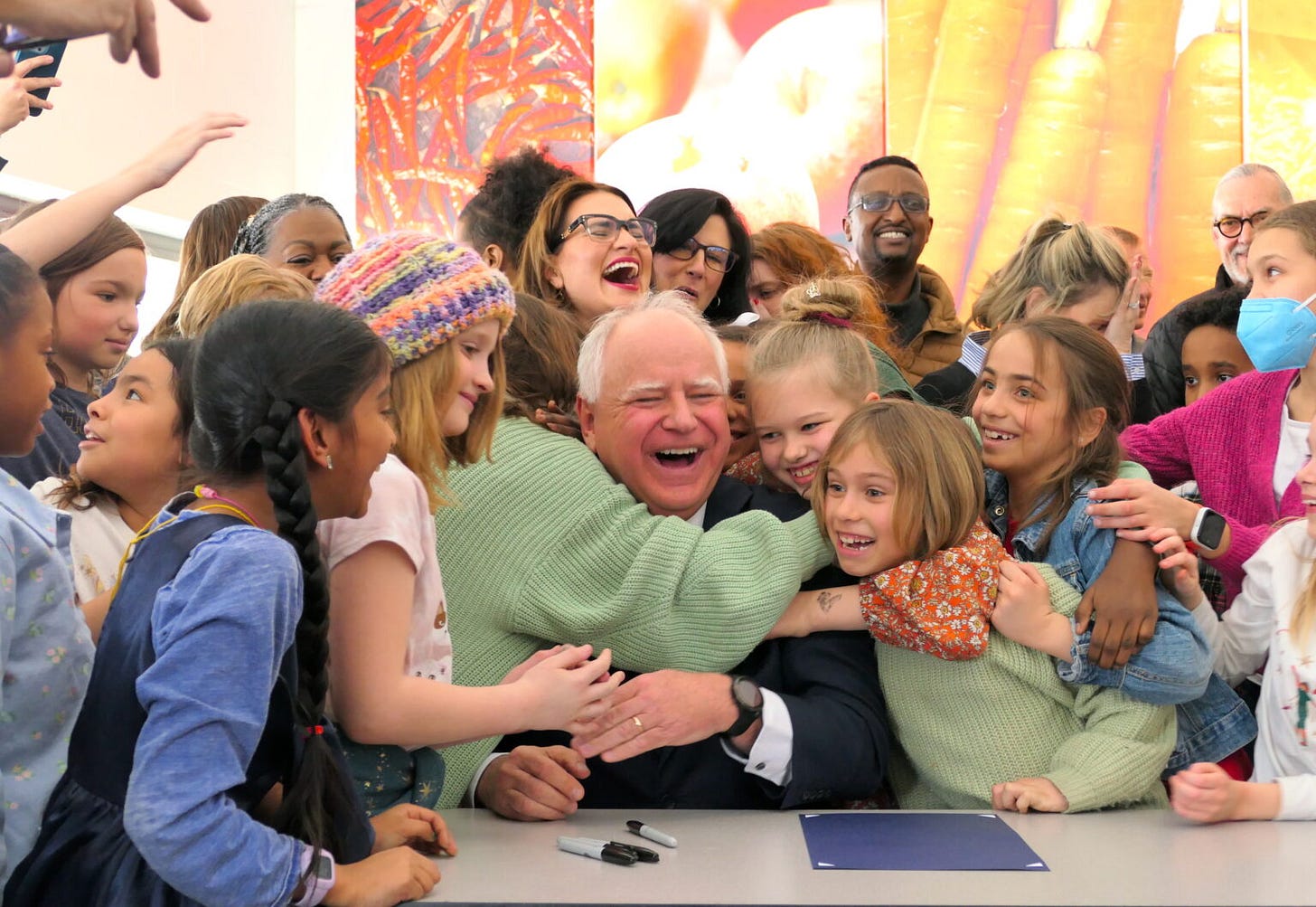On Weirdness, Part One
A Primer on Why & How Weird Works (and When it Doesn't)
(Laughing after voting to repeal the Affordable Care Act is weird.)
i.
There’s a lot to love about Tim Walz, but two profound gifts he’s given to the Democrats involve narrative (more on that, and why Story is Everything, here).
First, he is the first politician in forever, combining the best aspects of Bubba (more on him, here), Obama (more on him, here), and Biden (less about him, at least until November) to articulate, with conviction, why Democrats—and their policies, now and historically—are defensible, preferable, necessary. There’s still a great deal of work to be done here, but his contributions these past couple of months have begun to clear the path for a very overdue shift in narrative.
Second, the gift of “weird.”
Obviously, weird is complicated, can be broken down many ways and within many contexts, but for purposes of this discussion, it’s imperative to differentiate between “good” weird and…the other kind. (Pro tip: being weird is not unlike the famous definition of porn, courtesy of Supreme Court Justice Potter Stewart: one knows it when one sees it.)
Walz will deserve eternal gratitude if, fingers crossed, his succinct, indelible quote turns out to have been just what America needed, circa July/Aug 2024:
These are weird people on the other side. They want to take books away. They want to be in your exam room…
I’ve written a great deal, in the past, about how historically awful the Democrats have been at messaging, at telling stories. It’s been a bizarre failure of imagination, execution, and willingness (ability?) to recognize that yes, facts matter, and doing the right thing for the right reasons matters, but you have to find ways to make people feel what you’re saying, show them how their well-being is invested in what you’re accomplishing. Republicans, in part because they only have a handful of commandments they follow, figured this out and, in the age of Fox Media, have a 24/7 propaganda machine to drive their outreach, and for the most part all the players stay relentlessly on message (in fairness, the Dems have a much bigger tent meaning there’s a more diverse, disparate cross-section of demographics to at once reach and appeal to, but it remains astonishing and appalling at how badly the Dems typically sell their own good work).
Policies and politicking aside, another thing the Democrats have been unable/unwilling to do is call the more freakish Republicans out on their…freakishness. I think some of this is concerns about offending the more religious-leaning folks (who would never vote for a Democrat anyway), and a learned helplessness from the GOP’s decades-long, winning battle to work the refs and convince everyone that the media is “liberal.”
Enter Walz. He was a breath of much-needed fresh air mostly because he could walk the walk (a proud progressive who was both willing and able to defend his policies, and demonstrate why they worked for all Americans), but also because he pointed out what is—or should be—obvious to everyone outside (and some still within) the Fox News Bubble: many of these Republicans are deeply, disturbingly weird.
Crucially, we’re talking about the “bad” weird; where people—because of their political or religious beliefs, or because they want to get to heaven, or be rich, or appeal to women, or not be seen as the weirdos that they are—go out of their way to parrot cliched behavior, join packs, and find solace by leaning into bullying and browbeating. Look at the typical people at a Trump rally: do these people seem content, or particularly well-adjusted, comfortable in their skin? Do they look at an obese man sweating pancaked make-up in an oversized suit and say “yeah, that’s my guy,” because it feels natural, or is it because the solidarity of the crowd—so many rabid hyenas circling the cultural carcass Fox News serves up ‘round the clock for them to consume and snarl at—emboldens them, gives them an alibi, makes them feel less alone?
(Promoting policies that help children is not weird.)
Ironic reality: it's often the pursuit of being normal that causes weirdness and exposes it. Because there is no such thing as normal and in many cases, it involves trying to fit into pre-constructed identities and desires, all created by people seeking to either make a profit or enforce conformity. As a result, the attempt itself is a sort of surrender. (My collection This Kind of Man takes a deep dive into how this pathology impacts men and why received notions of masculinity are inherently toxic, and destructive.)
Being authentic, on the other hand, is itself a form of rebellion; as such, it will be derided most fiercely by those who can't fathom it (it's a tell, not unlike the fact that the most virulent homophobes turn out to be closeted, and virtuous so many anti-pedophile conspiracy theorists usually end up being frog-marched to prison, guilty of the very acts they spend so much energy decrying).
ii.
As always, it’s our artists—going back centuries, obviously—who own “weird” in all the right ways, and engage in the never-ending tug of war between defining weird in their own ways, and being dismissed (by weirdos) for being…weird.
In the next installment, I’ll take a deepish dive into how musicians are our best advocates for setting standards, redefining genres, and both allowing and encouraging us to embrace the weird (or turn and face the strange as Patron Saint of Weird & Wonderful once advised us to do—and more about him, here).
For now, while there are myriad options, from our literary heroes, to crystallize who one both describes and embodies (with examples, with irony, with compassion) how and why weird works, the oft-derided Charles Bukowski grabbed the brass ring with “Bluebird,” his ode to defiance and solidarity, his defense of compassion via very poetic social commentary.
Bluebird
there’s a bluebird in my heart that
wants to get out
but I’m too tough for him,
I say, stay in there, I’m not going
to let anybody see
you.
there’s a bluebird in my heart that
wants to get out
but I pour whiskey on him and inhale
cigarette smoke
and the whores and the bartenders
and the grocery clerks
never know that
he’s
in there.
there’s a bluebird in my heart that
wants to get out
but I’m too tough for him,
I say,
stay down, do you want to mess
me up?
you want to screw up the
works?
you want to blow my book sales in
Europe?
there’s a bluebird in my heart that
wants to get out
but I’m too clever, I only let him out
at night sometimes
when everybody’s asleep.
I say, I know that you’re there,
so don’t be sad.
then I put him back,
but he’s still singing a little
in there, I haven’t quite let him
die
and we sleep together like
that
with our
secret pact
and it’s nice enough to
make a man
weep, but I don’t
weep, do
you?





